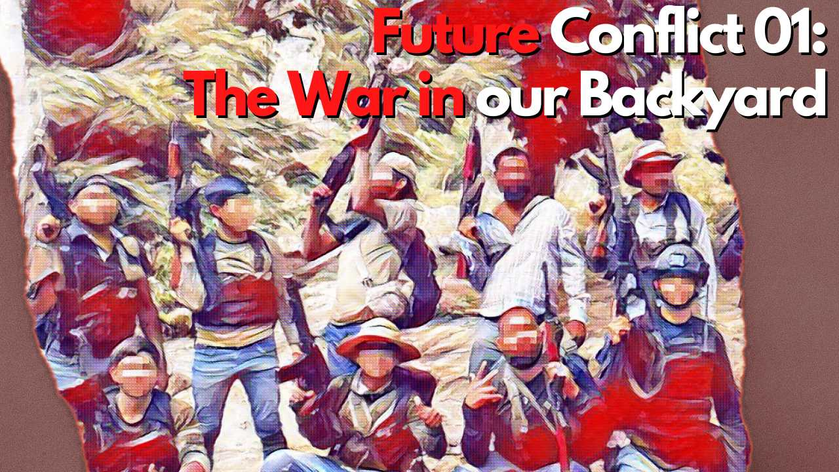As you know Future Conflict and the CFC are focused not on just current conflicts in the world but on trying to spot tomorrow’s hot spots. No single battle has the likelihood to impact the everyday life of Americans like the one currently being fought day in and day out on the Southwest US Border and south of the border in Mexico.
This is the first in a series that will lay out some of the ideas and threats that we look at on a regular basis on the FUTURE CONFLICT CHANNEL. We will endeavor to publish a new one each week. Finally apologies to so many of you who support our show through a variety of methods. We will do our best to give those who put money in our pockets regularly value for that money. Please continue to give us feedback to let us know how we are doing. If we drop the ball, call us on our shortcomings.
THE WAR IN OUR BACKYARD
The United States faces significant security threats from the Western Hemisphere, including the rise of authoritarian regimes and transnational criminal organizations and the influx of migrants to the US border. China's growing influence in the region poses an additional threat to American interests. To protect its security and maintain its dominance in the area, the United States must take a more proactive approach, including upholding the principles of the Monroe Doctrine and considering the use of military force as a last resort. However, any foreign policy actions must be carefully considered and prioritized to protect American security and interests.

It is becoming increasingly clear that Mexico is becoming a security threat to the United States. The leftist encroachment in the Southern hemisphere, exemplified by the rise of authoritarian regimes in countries like Venezuela, Nicaragua, and Brazil, is a clear and present danger to the stability and security of the United States.
One of the most pressing issues is the influx of migrants to the US border. The surge in migrant traffic, much of it fueled by violence and instability in Central America, has strained the resources of US border patrol and immigration authorities. Additionally, the presence of transnational criminal drug cartels, which operate with impunity in most of Mexico, poses a significant threat to the safety and security of the American people.
In this context, it is necessary for the United States to take a more proactive approach to secure its interests in the Western Hemisphere. This means upholding the principles of the Monroe Doctrine, which has long served as a cornerstone of US policy in the Western Hemisphere. As the dominant power on this side of the world, it is the responsibility of the United States to ensure the stability and security of its neighbors.
This approach is in line with the theory of Offensive Realism, as outlined by scholars such as John Mearsheimer. According to this theory, states are motivated by their own self-interest and will take action to protect their own security and increase their power relative to other states. In the case of the United States, intervention in the Western Hemisphere is necessary to protect its own security and to prevent the spread of authoritarianism and instability.

According to Mearsheimer, the United States should focus on maintaining its dominance in the Western Hemisphere and preventing China from becoming a regional hegemon in Asia. This is because regional hegemons pose a threat to the United States, as they have the freedom to intervene elsewhere and potentially threaten the security of the Western Hemisphere. Mearsheimer argues that the United States has traditionally intervened to prevent the rise of regional hegemons, such as Imperial Germany, Imperial Japan, Nazi Germany, and the Soviet Union.
However, Mearsheimer also points out that the United States' attempts to dominate the globe and promote democracy have often led to disasters and instability, as seen in its interventions in the Middle East and Europe. Therefore, it is essential for the United States to carefully consider its foreign policy actions and prioritize the protection of its own security and interests.
While Mearsheimer has advocated for a more proactive approach to securing US interests, particularly in the Western Hemisphere, he has also warned against the dangers of overextension and the risks of intervention. Mearsheimer has also been critical of the United States attempts to dominate the globe and promote democracy, arguing that such actions can lead to unintended consequences and destabilize the international system.
While Offensive Realism provides a compelling explanation for the United States' interest in maintaining its hegemony in the Western Hemisphere, the Constructivist perspective offers a different interpretation of the issue. According to Constructivism, the international system is not solely determined by material factors such as power and self-interest, but also by shared ideas and norms. From this perspective, the United States' historical role in the region as a defender of democracy and human rights has shaped the norms and institutions that currently govern the hemisphere. Therefore, the United States should seek to maintain its leadership in the Western Hemisphere not only for material reasons but also to preserve the norms and values that it has promoted in the region. Instead of resorting to military force or aggressive tactics, the United States could promote its interests by working with regional partners to strengthen democratic institutions, promote human rights, and address the root causes of migration and instability in the region.
While Constructivism offers a valuable alternative to traditional realism and liberalism in international relations, its overemphasis on the role of ideas and norms in shaping international behavior can be problematic. Critics argue that constructivists often neglect the influence of material factors such as power and resources, which continue to play a significant role in shaping the behavior of states. Additionally, some scholars have pointed out that constructivism's focus on ideational factors can be difficult to measure empirically, which can make it challenging to use in practical policy applications. While constructivism offers a useful perspective, it is important to approach it critically and fully understand its limitations. Sorry, I geeked out a little there, I rarely get to talk in-depth about this IR stuff. I promise to be a bit more cautious in the future.
One way in which China is expanding its influence in the Western Hemisphere is by filling the regional power gaps left by the United States' failure to assert itself. As the US has focused on other areas of the world, China has been able to increase its presence and influence in Latin America and the Caribbean through trade, investment, and infrastructure projects. This expansion of Chinese influence presents a potential threat to the United States, as it could lead to a decline in American influence and a shift in the balance of power in the region.
Given the severity of the issues facing the United States in the Southern Hemisphere, it is necessary to consider the use of military force as a policy option. The decay and degradation of governance in Mexico, the rise of violent cartels, and the unchecked population migration across the US southwestern border pose significant threats to the stability and security of the United States. A stronger and more robust military policy in the Southern Hemisphere could effectively address these issues and protect American interests.
Additionally, a more assertive military policy in the region could serve as a deterrence to further Chinese expansion in the Western Hemisphere. As Mearsheimer has argued, the United States should prioritize maintaining its dominance in the region and preventing the rise of a potential hegemon like China. By demonstrating a willingness to use military force to defend its interests, the United States can send a clear message to China and other potential adversaries that it is prepared to defend its dominance in the region.
It is important to recognize that the use of military force should not be undertaken lightly and should only be considered as a last resort. However, in the face of serious threats to American security and interests, it may be necessary to utilize military force in order to protect the stability and security of the United States and the Western Hemisphere.
The current state of the Western Hemisphere and the growth of China’s influence, and the erosion of civil norms in Mexica highlight the importance of the United States maintaining its dominance in the Western Hemisphere. It also emphasizes the need for the United States to carefully consider its foreign policy actions and prioritize protecting its own security and interests. As I have said many times before on the Council on Future Conflict the US has a vital natural interest in maintaining our hegemony in the Western Hemisphere and balancing against China, the only country in the world that can challenge the US. As China continues to expand its influence in the Western Hemisphere, it is important for the United States to remain vigilant and take proactive measures to secure its interests in the region.
















